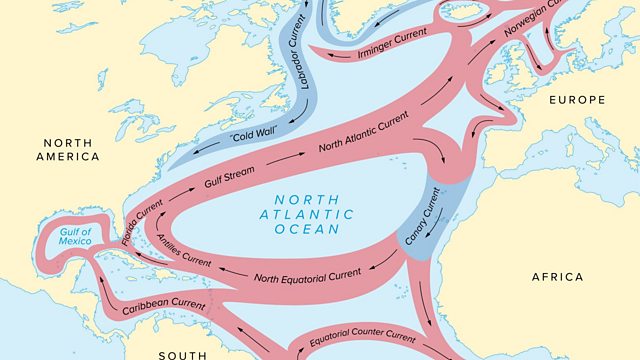Tracking ocean circulation systems
ESA plans to use satellite gravity data to track weakening ocean circulation systems – we learn how that helps us. Also, we hear about tooth proteins from 20 million years ago
The European Space Agency plans to use satellite gravity data to track weakening ocean circulation systems. Rory Bingham of the University of Bristol explains how these satellites can ‘weigh’ the Earth’s water and might help resolve whether we’re approaching the climate tipping point of a shutdown of ocean circulation in the Atlantic Ocean, something we've been following for a while.
Scientists have been able to retrieve ancient proteins from fossilized tooth enamel in the Canadian High Arctic. Ryan Sinclair Paterson from the University of Copenhagen tells us how he can fill in the blanks of the molecular tree of life with these proteins from over 20 million years ago.
A few weeks ago, we discussed evidence of an impact of a massive crater in north-western Australia from over 3 billion years ago. However, recent independent evidence from another team of geologists indicate that the size and age of this crater’s impact may not be what some had previously thought. Alec Brenner of Yale University talks us through his analysis of the geologic evidence.
Finally, we rediscover a forgotten pioneer of fusion science. Mark Chadwick discusses the research done by then-graduate student Arthur Ruhlig that helped develop the hydrogen bomb and thermonuclear physics.
[This audio has been corrected since original broadcast to amend a misattribution in the script. Our apologies.]
Presenter: Roland Pease
Producers: Imaan Moin with Alex Mansfield
Production Coordinator: Jana Bennett-Holesworth
(Image: Map of North Atlantic Ocean currents, with Gulf Stream and other currents. Credit: PeterHermesFurian Via Getty Images.)
Last on
More episodes
Featured
-
.
Broadcasts
- Thu 10 Jul 2025 19:32GMTÃÛÑ¿´«Ã½ World Service
- Thu 10 Jul 2025 22:32GMTÃÛÑ¿´«Ã½ World Service Europe and the Middle East
- Fri 11 Jul 2025 04:32GMTÃÛÑ¿´«Ã½ World Service Australasia, Americas and the Caribbean, South Asia & East Asia only
- Fri 11 Jul 2025 08:32GMTÃÛÑ¿´«Ã½ World Service
- Fri 11 Jul 2025 12:32GMTÃÛÑ¿´«Ã½ World Service
 Fri 11 Jul 2025 17:32GMTLive News
Fri 11 Jul 2025 17:32GMTLive News Sat 12 Jul 2025 01:32GMTLive News
Sat 12 Jul 2025 01:32GMTLive News- Sat 12 Jul 2025 01:32GMTÃÛÑ¿´«Ã½ World Service News Internet & East Asia only
- Sun 13 Jul 2025 03:32GMTÃÛÑ¿´«Ã½ World Service East and Southern Africa, Online, UK DAB/Freeview, Europe and the Middle East & West and Central Africa only
- Sun 13 Jul 2025 23:32GMTÃÛÑ¿´«Ã½ World Service except East Asia, Europe and the Middle East, News Internet & South Asia
- Mon 14 Jul 2025 00:32GMTÃÛÑ¿´«Ã½ World Service Europe and the Middle East
Podcast
-
![]()
Science In Action
The ÃÛÑ¿´«Ã½ brings you all the week's science news.


